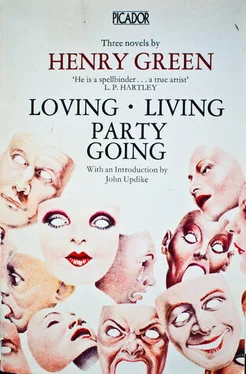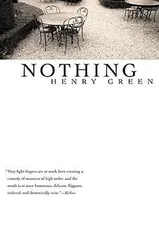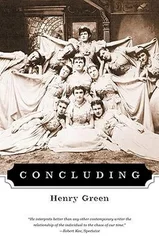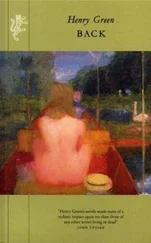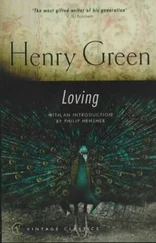Henry Green - Loving, Living, Party Going
Здесь есть возможность читать онлайн «Henry Green - Loving, Living, Party Going» весь текст электронной книги совершенно бесплатно (целиком полную версию без сокращений). В некоторых случаях можно слушать аудио, скачать через торрент в формате fb2 и присутствует краткое содержание. Год выпуска: 1982, Издательство: Picador, Жанр: Классическая проза, на английском языке. Описание произведения, (предисловие) а так же отзывы посетителей доступны на портале библиотеки ЛибКат.
- Название:Loving, Living, Party Going
- Автор:
- Издательство:Picador
- Жанр:
- Год:1982
- ISBN:нет данных
- Рейтинг книги:4 / 5. Голосов: 1
-
Избранное:Добавить в избранное
- Отзывы:
-
Ваша оценка:
- 80
- 1
- 2
- 3
- 4
- 5
Loving, Living, Party Going: краткое содержание, описание и аннотация
Предлагаем к чтению аннотацию, описание, краткое содержание или предисловие (зависит от того, что написал сам автор книги «Loving, Living, Party Going»). Если вы не нашли необходимую информацию о книге — напишите в комментариях, мы постараемся отыскать её.
Loving
Living
Party Going
Loving, Living, Party Going — читать онлайн бесплатно полную книгу (весь текст) целиком
Ниже представлен текст книги, разбитый по страницам. Система сохранения места последней прочитанной страницы, позволяет с удобством читать онлайн бесплатно книгу «Loving, Living, Party Going», без необходимости каждый раз заново искать на чём Вы остановились. Поставьте закладку, и сможете в любой момент перейти на страницу, на которой закончили чтение.
Интервал:
Закладка:
Henry Green
Loving, Living, Party Going
Introduction
HENRY GREEN IS a writer who always seems to need ‘introducing’, like a stranger at a party: dark, louche, awkward. It is odd, this need for an outrider to go ahead and smooth his way, because in his life he had friends enough, while his novels were viewed by people of dependable judgement as being among the best — perhaps the very best — of their time. Is it just that to later generations he is a little too ‘difficult’? Is it merely that Green requires a fraction more concentration than Greene? Perhaps so; but it is puzzling, this chronic shyness, when what his admirers are chiefly claiming for him is that he brings pleasure — a pleasure more intense, more original and more rewarding than that offered by any of his contemporaries.
Your first Green novel is in some ways your most memorable. I can still remember the incredulous pleasure with which I read Living in a battered library edition about thirty years ago. Here was a novelist who was doing something I had never experienced in fiction before. He seemed to have redrawn the familiar triangle between reader, writer and character, so that you somehow had the impression that you knew his characters better than he himself did. So real were they, so grand yet so fragile, that one felt protective of them — protective even against the plotting of the author whose skill had allowed one to know them in the first place.
Living is a story about people in a Birmingham iron foundry, most of them poor manual workers without much life beyond factory, family or a small terraced house. From the first page, the absence of certain common words from the prose brings us face to face with the concrete nature of their world: harsh, hard to mould, monotonous. Yet alongside this machine-age view of the ‘masses’, something underhand is going on. To begin with, it is in a kind of tenderness that Green allows to colour his descriptions; though when this feeling threatens to swell, he usually deflates it: sometimes our love for the people in the book seems unrequited — by them or by their author — and this can be painful. You vow not to fall so easily next time; yet soon the beguiling rhythms of the prose begin to seduce you once again, so that you long for emotional release, either within the fictional lives of the characters or in your unstable relationship with them. The inner shape of the novel in this way imitates our experience of living: it promises pattern, then withholds it, insisting on a formless banality; it describes intensity, but as part of a grudgingly accepted monotony; it glimpses poetry, but only from the corner of its eye.
Green came from a wealthy family, was educated at Eton and Oxford and knew many of the the people whose names are familiar from literary biographies of the period. His ‘research’ for Living was undertaken while he worked for his father’s company, which made plumbing supplies and beer-bottling equipment in a factory similar to the one described in the book. His attentive, unpatronising attitude to the working-class characters in the novel was cause for comment at the time it came out, in 1929, as was his largely satirical treatment of their employers. Green, however, had grander interests than those of ‘class’. Most of the workers are idle or conniving, and while the toffs are epitomised by a young man who can do tricks with a glass of water without spilling it on his dinner jacket, they also have their complications, their light and shade. Young Dupret, the factory owner’s son, may be a secret nose-picker, but he does see beauty in the work the men do.
Green hardly ever gives psychological accounts of his characters, their motives, childhoods or formative experiences. (He beautifully mocks the attempt to do so in Party Going, when one character tries to explain the hapless Alex with an unintentionally comic resume of what he has ‘been through’.) In this respect Green seems to belong to the Modernist movement, which preferred its depiction of reality broken up into its constituent planes, like Picasso’s, or fragmented, like Eliot’s. What makes Green distinctive, however, is that despite following the manner of his time, he is able to convey, in Living for instance, such a warm sense of what old Mr Craigan, or the talented but shifty Tarver, or Lily Gates, desperate to be a mother, is really like. One of the book’s greatest passages is the attempted elopement of Lily and Bert Jones to Canada, which takes them no further than Liverpool. In a scene that is comic and moving at the same time, one sees these human fragments move from one urban mass to another, then falter under the weight of their own insignificance. Even the story seems unable to bear it. ‘What is a town then, how do I know? What did they do?’ asks the narrative. Even at this self-consciously literary moment, one never loses sight of Lily in her childish desire to escape, so easily deflated, or Bert forced by his wounded bravado to abandon his lover when he cannot even track down his own parents in the sprawling, indifferent city of his birth.
Green wrote his first novel, Blindness, when he was eighteen. It is a book of astonishing maturity for one so young, yet it is Living that is the triumph of his precocity: a near-masterpiece written at the age of twenty-four. Of the three novels in this volume, Party Going (1939), though it has proved a most fertile ground for critics and theorists of narrative, is the one that is most likely to be problematic to the non-academic reader. The reason is simple: nothing much happens, and the characters are all more or less appalling. Frank Kermode has written that the way most contemporary readers see this novel is as ‘an expression of disgust at the conduct of the immature, ostentatious rich … and of admiration, even tenderness for the poor.’
Professor Kermode does not say that this is his own interpretation, however, and I must say that this is not at all the way that I read Party Going. Green was a naughty man in some ways, and occasionally his naughtiness gets into the books; usually it appears as a playful teasing of the reader (he likes characters to be known by different names: Mrs Henderson is for no clear reason both Evelyn and Evelyna; Angela Crevy is known by both her names; in Loving two characters have the same forename, and so on). Generally one feels that his is an attitude like that of Shakespeare in his comedies: the world is an absurd mess, you cannot blame me if in our enchanted wood there are two men called Jacques. Green talked in interviews about getting a ‘dig’ in at various real people and at the aristocracy in general, and doubtless he took some small pleasure from exactly that (his stern father is guyed in the figure of old Dupret in Living; what Oedipal laughter must have rung in his head when he wrote the scene with the courtesan brought in the revive the old man!). But the artist in him was above the drab politics of twentieth-century class warfare. For Green is a plotter — not in the sense of someone full of narrative surprises, because in the fogbound world of Victoria Station that is the setting of this novel the most exciting things that happen are that a rich young woman has a bath and a manservant gets a kiss — but in the manner of a spider with a web in which these flies are caught and then inspected.
Party Going is at pains to point out the shallowness of its characters (‘Robin … wondered angrily how Angela could go with these revolting people’), but its artistic purpose is surely more ambitious than that of social criticism. Green, in his youth, was an addicted cinema-goer, and much has reasonably been made of his cinematic technique: the short, flickering scenes, the jump-cuts and so on. However, it seems to me that a more helpful, if necessarily approximate, analogy is with music. Living must, I suppose, be a symphony by an ‘avant-garde’ Russian, though with more melody than that comparison perhaps suggests; Loving could be a collaboration between Britten and Vaughan Williams; but Party Going is pure chamber music. This is amoral virtuosity, unashamed, self-regarding in places, dizzy with its own patterns of invention.
Читать дальшеИнтервал:
Закладка:
Похожие книги на «Loving, Living, Party Going»
Представляем Вашему вниманию похожие книги на «Loving, Living, Party Going» списком для выбора. Мы отобрали схожую по названию и смыслу литературу в надежде предоставить читателям больше вариантов отыскать новые, интересные, ещё непрочитанные произведения.
Обсуждение, отзывы о книге «Loving, Living, Party Going» и просто собственные мнения читателей. Оставьте ваши комментарии, напишите, что Вы думаете о произведении, его смысле или главных героях. Укажите что конкретно понравилось, а что нет, и почему Вы так считаете.
